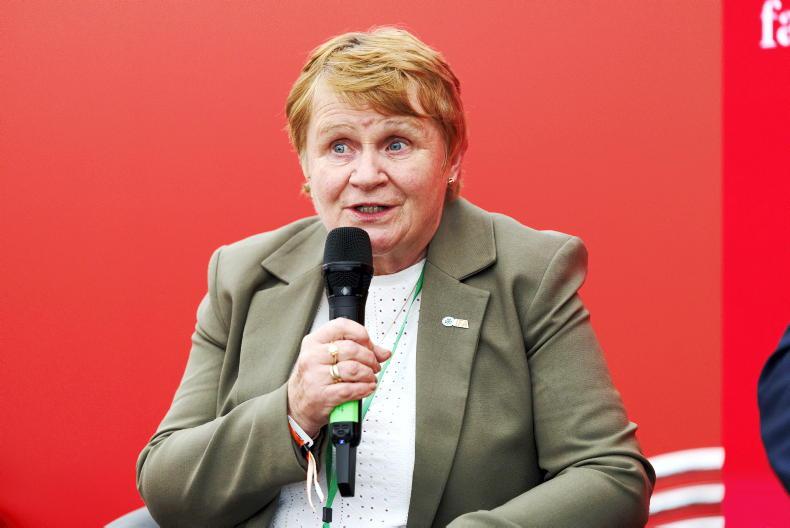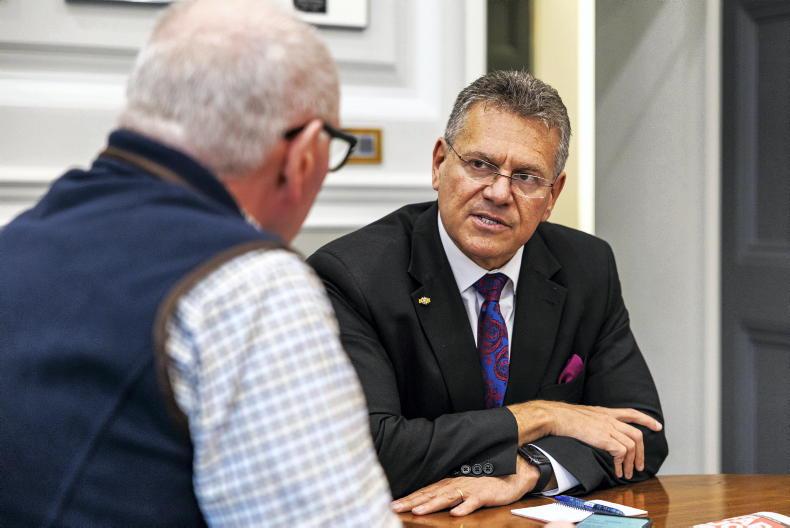It is looking increasingly likely that Britain and Brussels are on course for a Brexit bust-up at the end of the year. The implications for Irish farmers are severe. In 2019, Minister for Agriculture Michael Creed said the financial hit on the sector could be as high as €1.7bn. In the absence of a major and sustained support package from Brussels, our suckler beef sector would almost certainly be wiped out with other sectors also severely affected.
Fears of a bust-up have intensified following comments made by UK chancellor of the exchequer Sajid Javid in an interview with the Financial Times last Friday. In the context of the UK staying locked in with Brussels rules after Brexit, he said: “There will be no alignment, we will not be a rule taker, we will not be in the single market and we will not be in the customs union – and we will do this by the end of the year.”
The statement exposes the extent to which the Johnson-led government has hardened the UK’s stance since Theresa May’s original Brexit deal – which indicated consideration would be given to aligning with EU standards in relevant areas.
It also demonstrates the diametrically opposed positions Britain and Brussels will take into negotiations in the next few weeks. Brussels maintains that a comprehensive trade deal would only be possible if the UK was to maintain regulatory alignment.
Meanwhile, this week, Boris Johnson announced plans to run trade negotiations with the US in parallel to those with the EU. The twin-track approach is clearly aimed at playing one against the other. It is a high-risk strategy, expecting a largely untested negotiating team to run two highly complex sets of trade negotiations where there can only really be one winner.
Hormone beef
In an interview with the Irish Farmers Journal this week, An Tánaiste Simon Coveney made it clear that “if we have hormone beef coming into the UK, there are going to be barriers between the EU and UK in terms of trade … products that come from the UK to Ireland and elsewhere – we won’t be able to trust the provenance of where that product is coming from”.

An Tánaiste Sinon Coveney being interviewed by Justin McCarthy while campaigning at Corrin Mart. \ Donal O'Leary
The Tánaiste’s comments point to the fact that agreement on a comprehensive free-trade deal between the EU and UK would not only require UK production standards to be aligned to EU regulation but also non-EU imports into the UK – otherwise the free movement of product would not be possible. Phelim O’Neill details the complexity here and outlines previous commitments given by Commissioner Phil Hogan in this regard when discussing Mercosur.
Given comments made by the US ambassador to the UK, Woody Johnson, it is highly unlikely that the US would see any value in a trade deal that forced US farmers to comply with EU standards when exporting to the UK. The cost of compliance with EU standards and the need to abandon growth hormones saw Canadian farmers fill less than 5% of their 2018 EU beef export quota secured under the Comprehensive Economic and Trade Agreement (CETA) trade deal.
Unless we see major concessions over the coming months, the EU and UK are on a collision course – the outcome of which would be a crash-out Brexit. This week, An Taoiseach Leo Varadkar spoke of securing a zero tariff and quota-free trade deal. Let’s be clear: a free-trade agreement that only secures tariff- and quota-free access would provide little comfort to Irish farmers. Any deal must address the issue of non-tariff barriers while also ensuring the value of the UK market is protected – therefore preventing it from being devalued by cheaper non-EU imports.
Of course, the political brinkmanship being played between the UK, EU and US is a long way off the minds of Irish farmers preparing for a busy calving period. However, given the recent positioning of the UK government, achieving a Brexit outcome that protects farmers’ income still seems very far off.
In the days that remain ahead of the general election, it is essential that farm organisations, farmers and rural Ireland put Brexit front and centre. All political parties must be forced to outline their strategy for – and commitment to – protecting farm incomes, either in the wake of a no-deal Brexit or a deal that does not protect the value of the UK market.
Hoping for the best is not a strategy and popular soundbites are of little use. Irish farmers will quickly become political pawns if a future government does not have the willingness or the capacity to secure a major funding commitment from the EU to protect their incomes. The IFA has rightly put Brexit as one of its central planks in its election manifesto.

It is looking increasingly likely that Britain and Brussels are on course for a Brexit bust-up at the end of the year. The implications for Irish farmers are severe. In 2019, Minister for Agriculture Michael Creed said the financial hit on the sector could be as high as €1.7bn. In the absence of a major and sustained support package from Brussels, our suckler beef sector would almost certainly be wiped out with other sectors also severely affected.
Fears of a bust-up have intensified following comments made by UK chancellor of the exchequer Sajid Javid in an interview with the Financial Times last Friday. In the context of the UK staying locked in with Brussels rules after Brexit, he said: “There will be no alignment, we will not be a rule taker, we will not be in the single market and we will not be in the customs union – and we will do this by the end of the year.”
The statement exposes the extent to which the Johnson-led government has hardened the UK’s stance since Theresa May’s original Brexit deal – which indicated consideration would be given to aligning with EU standards in relevant areas.
It also demonstrates the diametrically opposed positions Britain and Brussels will take into negotiations in the next few weeks. Brussels maintains that a comprehensive trade deal would only be possible if the UK was to maintain regulatory alignment.
Meanwhile, this week, Boris Johnson announced plans to run trade negotiations with the US in parallel to those with the EU. The twin-track approach is clearly aimed at playing one against the other. It is a high-risk strategy, expecting a largely untested negotiating team to run two highly complex sets of trade negotiations where there can only really be one winner.
Hormone beef
In an interview with the Irish Farmers Journal this week, An Tánaiste Simon Coveney made it clear that “if we have hormone beef coming into the UK, there are going to be barriers between the EU and UK in terms of trade … products that come from the UK to Ireland and elsewhere – we won’t be able to trust the provenance of where that product is coming from”.

An Tánaiste Sinon Coveney being interviewed by Justin McCarthy while campaigning at Corrin Mart. \ Donal O'Leary
The Tánaiste’s comments point to the fact that agreement on a comprehensive free-trade deal between the EU and UK would not only require UK production standards to be aligned to EU regulation but also non-EU imports into the UK – otherwise the free movement of product would not be possible. Phelim O’Neill details the complexity here and outlines previous commitments given by Commissioner Phil Hogan in this regard when discussing Mercosur.
Given comments made by the US ambassador to the UK, Woody Johnson, it is highly unlikely that the US would see any value in a trade deal that forced US farmers to comply with EU standards when exporting to the UK. The cost of compliance with EU standards and the need to abandon growth hormones saw Canadian farmers fill less than 5% of their 2018 EU beef export quota secured under the Comprehensive Economic and Trade Agreement (CETA) trade deal.
Unless we see major concessions over the coming months, the EU and UK are on a collision course – the outcome of which would be a crash-out Brexit. This week, An Taoiseach Leo Varadkar spoke of securing a zero tariff and quota-free trade deal. Let’s be clear: a free-trade agreement that only secures tariff- and quota-free access would provide little comfort to Irish farmers. Any deal must address the issue of non-tariff barriers while also ensuring the value of the UK market is protected – therefore preventing it from being devalued by cheaper non-EU imports.
Of course, the political brinkmanship being played between the UK, EU and US is a long way off the minds of Irish farmers preparing for a busy calving period. However, given the recent positioning of the UK government, achieving a Brexit outcome that protects farmers’ income still seems very far off.
In the days that remain ahead of the general election, it is essential that farm organisations, farmers and rural Ireland put Brexit front and centre. All political parties must be forced to outline their strategy for – and commitment to – protecting farm incomes, either in the wake of a no-deal Brexit or a deal that does not protect the value of the UK market.
Hoping for the best is not a strategy and popular soundbites are of little use. Irish farmers will quickly become political pawns if a future government does not have the willingness or the capacity to secure a major funding commitment from the EU to protect their incomes. The IFA has rightly put Brexit as one of its central planks in its election manifesto.













SHARING OPTIONS